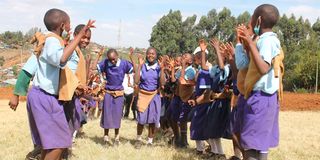All must play their roles for CBC to work

Grade Five pupils at DEB Primary School in Elburgon, Nakuru County perform a topical and patriotic song during a Music Assessment in the Competency-Based Curriculum on February 9, 2022.
The Kenya Primary School Education Assessment (KPSEA) will not be used for placement of learners to junior secondary schools but to monitor the progress of CBC.
This pronouncement by the Education Cabinet Secretary might have angered some. However, Grade Six candidates should know that they are not lost or wasted.
Secondly, the CS said the junior secondary school will be domiciled in primary school.
This does not mean that Grade Seven learners will be in primary. Rather, it is just a matter of location.
Thirdly, the learners may feel that being in a primary school while doing secondary work is not the best experience. They will, however, eventually move to senior secondary.
The national conversation we should be having is on the adequacy and preparedness of teachers.
President William Ruto has indicated that the government will hire 30,000 teachers in January to bridge the staffing gap in public schools, which stands at 11,600.
This is an indicator that the government is keen on CBC and interested in the education sector as a whole. This is commendable. This is also the highest number to be employed ever.
While the focus will be on those who are CBC-trained, those who graduated as early as 2013 should be given preference as well as those living with disabilities. Some unemployed teachers may be advised by their friends not to apply for teaching jobs because they graduated recently. They should, however, not listen to such people.
That said, we need to realise that there would be no CBC without additional teachers.
Investing in more teachers will unlock many social and economic benefits.
For instance, research shows that individuals who graduate and have access to quality education throughout primary and secondary are more likely to find gainful employment, have stable families and be active and productive citizens. They are also less likely to commit serious crimes, and less likely to place high demands on the public healthcare system. Therefore, investing in public education is more cost-effective than facing the social and economic consequences of having an underfunded, low-quality education.
For CBC to succeed, all stakeholders must work together.
Although some parents were and are against the many home assignments, they just have to embrace their parental engagement role. They should always be ready to do what is good for the child. And nothing can be better than a good education.
Aross Samwel Onyango, Kwale




